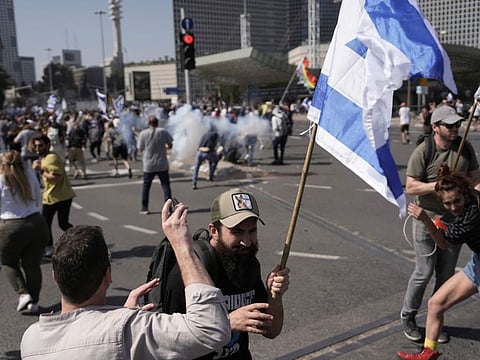Israeli police crack down, clash with anti-Netanyahu protest
Thousands launch ‘national disruption day’ against plan to overhaul judicial system

TEL AVIV: Weeks of anti-government protests in Israel turned violent on Wednesday for the first time as police fired stun grenades and a water cannon at demonstrators who blocked a Tel Aviv highway.
The crackdown came shortly after Israel’s hardline national security minister urged a tough response to what he said were “anarchists.”
The violence came as thousands across the country launched a “national disruption day” against the government’s plan to overhaul Israel’s judicial system. The protests moved later Wednesday to Jerusalem, where protesters rallied outside the Knesset, Israel’s parliament, chanting .
Demonstrators were set to gather in the evening in front of Prime Minister Benjamin Netanyahu’s private residence in central Jerusalem.
Netanyahu’s allies say the proposed judicial overhaul programme is meant to reduce the influence of unelected judges. But critics, including influential business leaders and former military figures, say Netanyahu is pushing the country toward authoritarian rule and has a clear conflict of interest in targeting judges as he stands trial on corruption charges.
Since Netanyahu’s government took office two months ago, tens of thousands of people have taken to the streets to protest the changes, which they say endangers Israel’s fragile system of checks and balances. Wednesday, however, marked the first time police used force against the crowds.
The crisis has sent shock waves through Israel and presented Netanyahu with a serious challenge. A wave of Israeli-Palestinian violence in the occupied West Bank has compounded his troubles.
For now, his government is barreling ahead with the legal changes — highlighted by proposals that would give Netanyahu’s allies the power to appoint the country’s judges and other bills that would weaken the Supreme Court’s authorities.
Netanyahu and his government, made up of ultranationalists, have branded the protesters anarchists, while stopping short of condemning a West Bank settler mob that torched a Palestinian town earlier this week.
The legal overhaul has sparked an unprecedented uproar, with weeks of mass protests, criticism from legal experts and rare demonstrations by army reservists who have pledged to disobey orders under what they say will be a dictatorship after the overhaul passes. Business leaders, the country’s booming tech sector and leading economists have warned of economic turmoil under the judicial changes. Israel’s international allies have expressed concern.
Early Wednesday, police arrived on horseback in the center of the seaside metropolis of Tel Aviv, hurled stun grenades and used a water cannon against thousands of protesters who chanted “democracy” and “police state.” A video posted on social media showed a police officer pinning down a protester with his knee on the man’s neck and another showed a man who reportedly had his ear ripped off by a stun grenade.
Facing the police, protesters also chanted “where were you,” a reference to the absence of security forces during the settler attack on the Palestinian town of Huwara, which took hours to quell and which the military said it was not prepared for.
Police said protesters threw rocks and water bottles at the officers. Police said they arrested 39 protesters in Tel Aviv for disturbing the peace while 11 people were hospitalized with various injuries, according to Tel Aviv Sourasky Medical Center.
Earlier Wednesday, protesters blocked Tel Aviv’s main freeway and the highway connecting the city to Jerusalem, halting rush hour traffic for about an hour. At busy train stations in Tel Aviv, protesters prevented trains from departing by blocking their doors.
Justice Minister Yariv Levin, the overhaul’s main architect, said Tuesday that the coalition aims to ram through some of the judicial overhaul bills into law in the coming month, before the parliament goes on recess for the Passover holiday on April 2.
The Knesset also was also set to cast a preliminary vote Wednesday on a separate proposal to protect Netanyahu from being removed from his post, a move that comes following calls to the country’s attorney general to declare him “unfit for office.”
Netanyahu has been the centre of a years-long political crisis in Israel, with former allies turning on him and refusing to sit with him in government because of his corruption charges. That political turmoil, with five elections in four years, culminated in Netanyahu returning to power late last year, with ultranationalist and ultra-Orthodox parties as partners in the current far-right government.


